An Essay on Genetic Drift: Causes, Effects, and Implications
VerifiedAdded on 2019/09/24
|9
|2723
|326
Essay
AI Summary
This essay provides a comprehensive overview of genetic drift, also known as the Sewall Wright effect or allelic effect, a fundamental concept in population genetics. It defines genetic drift as the deviation in expected allele frequencies within a finite population over time, caused by random sampling. The essay explores the features of genetic drift, emphasizing its importance in evolution by enabling natural selection and adaptation, and addresses whether it offers a survival advantage. It delves into the causes of genetic drift, including nonrandom mating patterns (inbreeding and outbreeding), random forces, population distribution, and migration. Furthermore, it examines the genetic bottleneck and founder effects, which are major consequences of genetic drift. The essay provides examples and clarifies the differences between genetic drift and mutation, highlighting how environmental factors can influence population genetics.

Running head: Blog writing
BLOG WRITING
BLOG WRITING
Paraphrase This Document
Need a fresh take? Get an instant paraphrase of this document with our AI Paraphraser
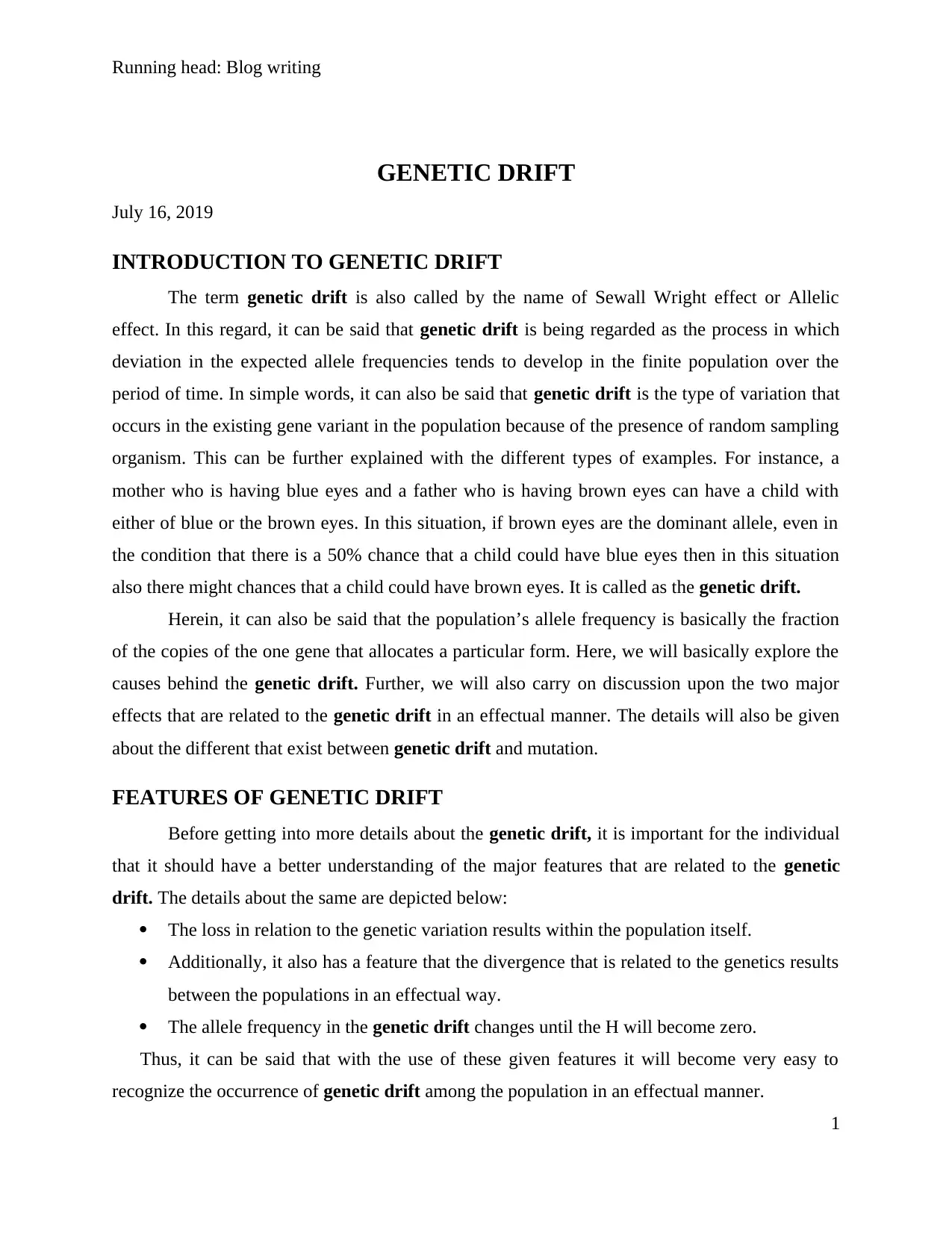
Running head: Blog writing
GENETIC DRIFT
July 16, 2019
INTRODUCTION TO GENETIC DRIFT
The term genetic drift is also called by the name of Sewall Wright effect or Allelic
effect. In this regard, it can be said that genetic drift is being regarded as the process in which
deviation in the expected allele frequencies tends to develop in the finite population over the
period of time. In simple words, it can also be said that genetic drift is the type of variation that
occurs in the existing gene variant in the population because of the presence of random sampling
organism. This can be further explained with the different types of examples. For instance, a
mother who is having blue eyes and a father who is having brown eyes can have a child with
either of blue or the brown eyes. In this situation, if brown eyes are the dominant allele, even in
the condition that there is a 50% chance that a child could have blue eyes then in this situation
also there might chances that a child could have brown eyes. It is called as the genetic drift.
Herein, it can also be said that the population’s allele frequency is basically the fraction
of the copies of the one gene that allocates a particular form. Here, we will basically explore the
causes behind the genetic drift. Further, we will also carry on discussion upon the two major
effects that are related to the genetic drift in an effectual manner. The details will also be given
about the different that exist between genetic drift and mutation.
FEATURES OF GENETIC DRIFT
Before getting into more details about the genetic drift, it is important for the individual
that it should have a better understanding of the major features that are related to the genetic
drift. The details about the same are depicted below:
The loss in relation to the genetic variation results within the population itself.
Additionally, it also has a feature that the divergence that is related to the genetics results
between the populations in an effectual way.
The allele frequency in the genetic drift changes until the H will become zero.
Thus, it can be said that with the use of these given features it will become very easy to
recognize the occurrence of genetic drift among the population in an effectual manner.
1
GENETIC DRIFT
July 16, 2019
INTRODUCTION TO GENETIC DRIFT
The term genetic drift is also called by the name of Sewall Wright effect or Allelic
effect. In this regard, it can be said that genetic drift is being regarded as the process in which
deviation in the expected allele frequencies tends to develop in the finite population over the
period of time. In simple words, it can also be said that genetic drift is the type of variation that
occurs in the existing gene variant in the population because of the presence of random sampling
organism. This can be further explained with the different types of examples. For instance, a
mother who is having blue eyes and a father who is having brown eyes can have a child with
either of blue or the brown eyes. In this situation, if brown eyes are the dominant allele, even in
the condition that there is a 50% chance that a child could have blue eyes then in this situation
also there might chances that a child could have brown eyes. It is called as the genetic drift.
Herein, it can also be said that the population’s allele frequency is basically the fraction
of the copies of the one gene that allocates a particular form. Here, we will basically explore the
causes behind the genetic drift. Further, we will also carry on discussion upon the two major
effects that are related to the genetic drift in an effectual manner. The details will also be given
about the different that exist between genetic drift and mutation.
FEATURES OF GENETIC DRIFT
Before getting into more details about the genetic drift, it is important for the individual
that it should have a better understanding of the major features that are related to the genetic
drift. The details about the same are depicted below:
The loss in relation to the genetic variation results within the population itself.
Additionally, it also has a feature that the divergence that is related to the genetics results
between the populations in an effectual way.
The allele frequency in the genetic drift changes until the H will become zero.
Thus, it can be said that with the use of these given features it will become very easy to
recognize the occurrence of genetic drift among the population in an effectual manner.
1
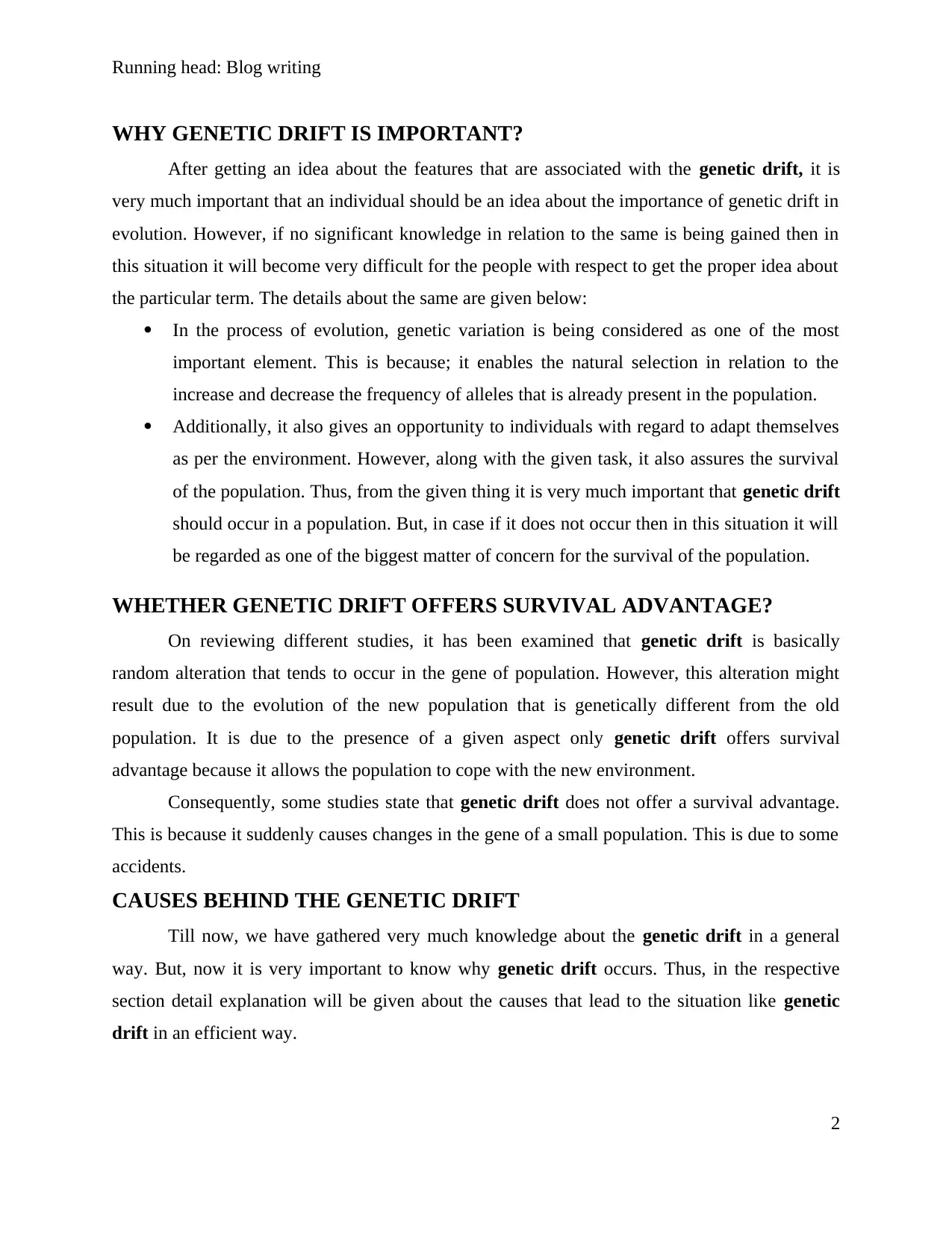
Running head: Blog writing
WHY GENETIC DRIFT IS IMPORTANT?
After getting an idea about the features that are associated with the genetic drift, it is
very much important that an individual should be an idea about the importance of genetic drift in
evolution. However, if no significant knowledge in relation to the same is being gained then in
this situation it will become very difficult for the people with respect to get the proper idea about
the particular term. The details about the same are given below:
In the process of evolution, genetic variation is being considered as one of the most
important element. This is because; it enables the natural selection in relation to the
increase and decrease the frequency of alleles that is already present in the population.
Additionally, it also gives an opportunity to individuals with regard to adapt themselves
as per the environment. However, along with the given task, it also assures the survival
of the population. Thus, from the given thing it is very much important that genetic drift
should occur in a population. But, in case if it does not occur then in this situation it will
be regarded as one of the biggest matter of concern for the survival of the population.
WHETHER GENETIC DRIFT OFFERS SURVIVAL ADVANTAGE?
On reviewing different studies, it has been examined that genetic drift is basically
random alteration that tends to occur in the gene of population. However, this alteration might
result due to the evolution of the new population that is genetically different from the old
population. It is due to the presence of a given aspect only genetic drift offers survival
advantage because it allows the population to cope with the new environment.
Consequently, some studies state that genetic drift does not offer a survival advantage.
This is because it suddenly causes changes in the gene of a small population. This is due to some
accidents.
CAUSES BEHIND THE GENETIC DRIFT
Till now, we have gathered very much knowledge about the genetic drift in a general
way. But, now it is very important to know why genetic drift occurs. Thus, in the respective
section detail explanation will be given about the causes that lead to the situation like genetic
drift in an efficient way.
2
WHY GENETIC DRIFT IS IMPORTANT?
After getting an idea about the features that are associated with the genetic drift, it is
very much important that an individual should be an idea about the importance of genetic drift in
evolution. However, if no significant knowledge in relation to the same is being gained then in
this situation it will become very difficult for the people with respect to get the proper idea about
the particular term. The details about the same are given below:
In the process of evolution, genetic variation is being considered as one of the most
important element. This is because; it enables the natural selection in relation to the
increase and decrease the frequency of alleles that is already present in the population.
Additionally, it also gives an opportunity to individuals with regard to adapt themselves
as per the environment. However, along with the given task, it also assures the survival
of the population. Thus, from the given thing it is very much important that genetic drift
should occur in a population. But, in case if it does not occur then in this situation it will
be regarded as one of the biggest matter of concern for the survival of the population.
WHETHER GENETIC DRIFT OFFERS SURVIVAL ADVANTAGE?
On reviewing different studies, it has been examined that genetic drift is basically
random alteration that tends to occur in the gene of population. However, this alteration might
result due to the evolution of the new population that is genetically different from the old
population. It is due to the presence of a given aspect only genetic drift offers survival
advantage because it allows the population to cope with the new environment.
Consequently, some studies state that genetic drift does not offer a survival advantage.
This is because it suddenly causes changes in the gene of a small population. This is due to some
accidents.
CAUSES BEHIND THE GENETIC DRIFT
Till now, we have gathered very much knowledge about the genetic drift in a general
way. But, now it is very important to know why genetic drift occurs. Thus, in the respective
section detail explanation will be given about the causes that lead to the situation like genetic
drift in an efficient way.
2
⊘ This is a preview!⊘
Do you want full access?
Subscribe today to unlock all pages.

Trusted by 1+ million students worldwide
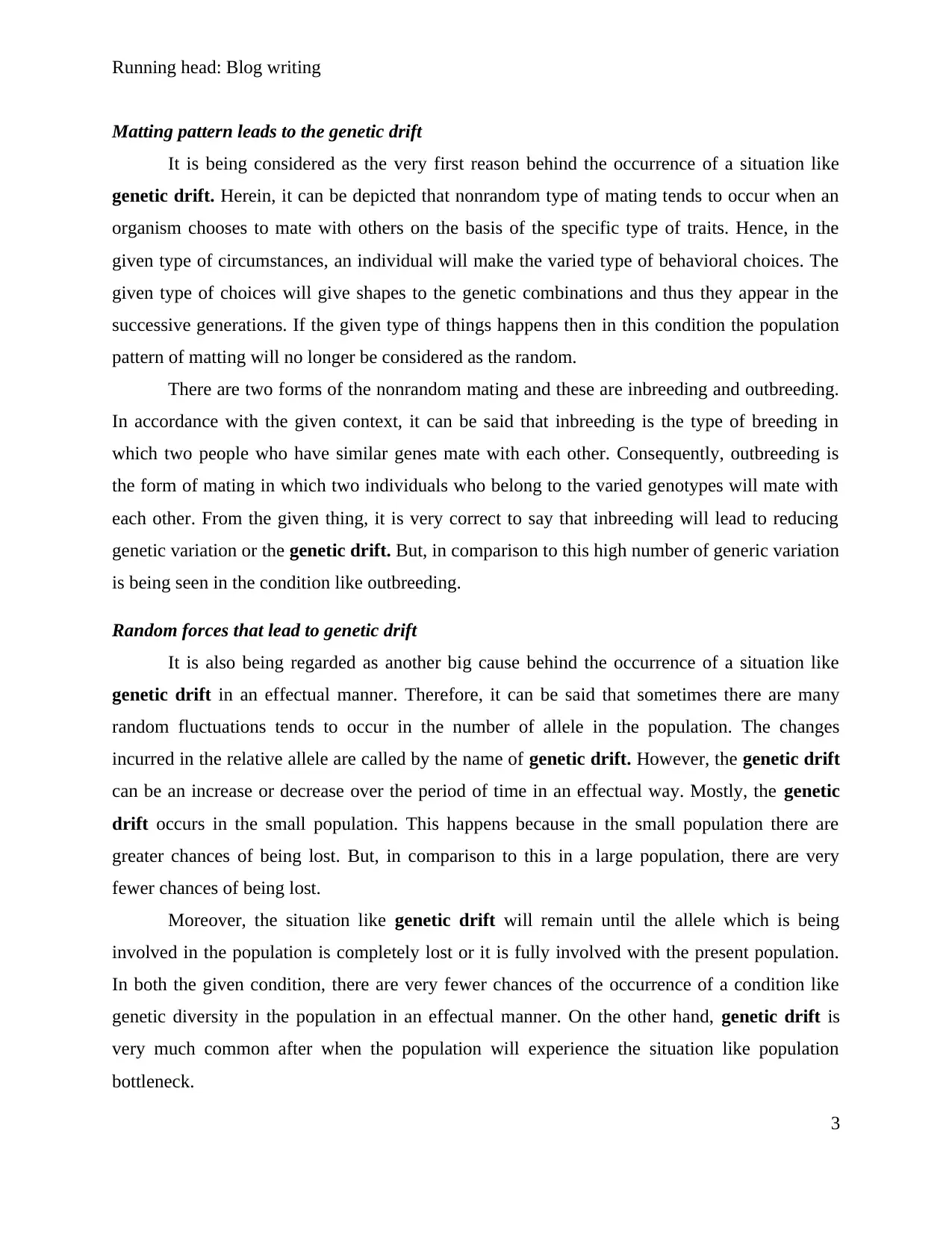
Running head: Blog writing
Matting pattern leads to the genetic drift
It is being considered as the very first reason behind the occurrence of a situation like
genetic drift. Herein, it can be depicted that nonrandom type of mating tends to occur when an
organism chooses to mate with others on the basis of the specific type of traits. Hence, in the
given type of circumstances, an individual will make the varied type of behavioral choices. The
given type of choices will give shapes to the genetic combinations and thus they appear in the
successive generations. If the given type of things happens then in this condition the population
pattern of matting will no longer be considered as the random.
There are two forms of the nonrandom mating and these are inbreeding and outbreeding.
In accordance with the given context, it can be said that inbreeding is the type of breeding in
which two people who have similar genes mate with each other. Consequently, outbreeding is
the form of mating in which two individuals who belong to the varied genotypes will mate with
each other. From the given thing, it is very correct to say that inbreeding will lead to reducing
genetic variation or the genetic drift. But, in comparison to this high number of generic variation
is being seen in the condition like outbreeding.
Random forces that lead to genetic drift
It is also being regarded as another big cause behind the occurrence of a situation like
genetic drift in an effectual manner. Therefore, it can be said that sometimes there are many
random fluctuations tends to occur in the number of allele in the population. The changes
incurred in the relative allele are called by the name of genetic drift. However, the genetic drift
can be an increase or decrease over the period of time in an effectual way. Mostly, the genetic
drift occurs in the small population. This happens because in the small population there are
greater chances of being lost. But, in comparison to this in a large population, there are very
fewer chances of being lost.
Moreover, the situation like genetic drift will remain until the allele which is being
involved in the population is completely lost or it is fully involved with the present population.
In both the given condition, there are very fewer chances of the occurrence of a condition like
genetic diversity in the population in an effectual manner. On the other hand, genetic drift is
very much common after when the population will experience the situation like population
bottleneck.
3
Matting pattern leads to the genetic drift
It is being considered as the very first reason behind the occurrence of a situation like
genetic drift. Herein, it can be depicted that nonrandom type of mating tends to occur when an
organism chooses to mate with others on the basis of the specific type of traits. Hence, in the
given type of circumstances, an individual will make the varied type of behavioral choices. The
given type of choices will give shapes to the genetic combinations and thus they appear in the
successive generations. If the given type of things happens then in this condition the population
pattern of matting will no longer be considered as the random.
There are two forms of the nonrandom mating and these are inbreeding and outbreeding.
In accordance with the given context, it can be said that inbreeding is the type of breeding in
which two people who have similar genes mate with each other. Consequently, outbreeding is
the form of mating in which two individuals who belong to the varied genotypes will mate with
each other. From the given thing, it is very correct to say that inbreeding will lead to reducing
genetic variation or the genetic drift. But, in comparison to this high number of generic variation
is being seen in the condition like outbreeding.
Random forces that lead to genetic drift
It is also being regarded as another big cause behind the occurrence of a situation like
genetic drift in an effectual manner. Therefore, it can be said that sometimes there are many
random fluctuations tends to occur in the number of allele in the population. The changes
incurred in the relative allele are called by the name of genetic drift. However, the genetic drift
can be an increase or decrease over the period of time in an effectual way. Mostly, the genetic
drift occurs in the small population. This happens because in the small population there are
greater chances of being lost. But, in comparison to this in a large population, there are very
fewer chances of being lost.
Moreover, the situation like genetic drift will remain until the allele which is being
involved in the population is completely lost or it is fully involved with the present population.
In both the given condition, there are very fewer chances of the occurrence of a condition like
genetic diversity in the population in an effectual manner. On the other hand, genetic drift is
very much common after when the population will experience the situation like population
bottleneck.
3
Paraphrase This Document
Need a fresh take? Get an instant paraphrase of this document with our AI Paraphraser
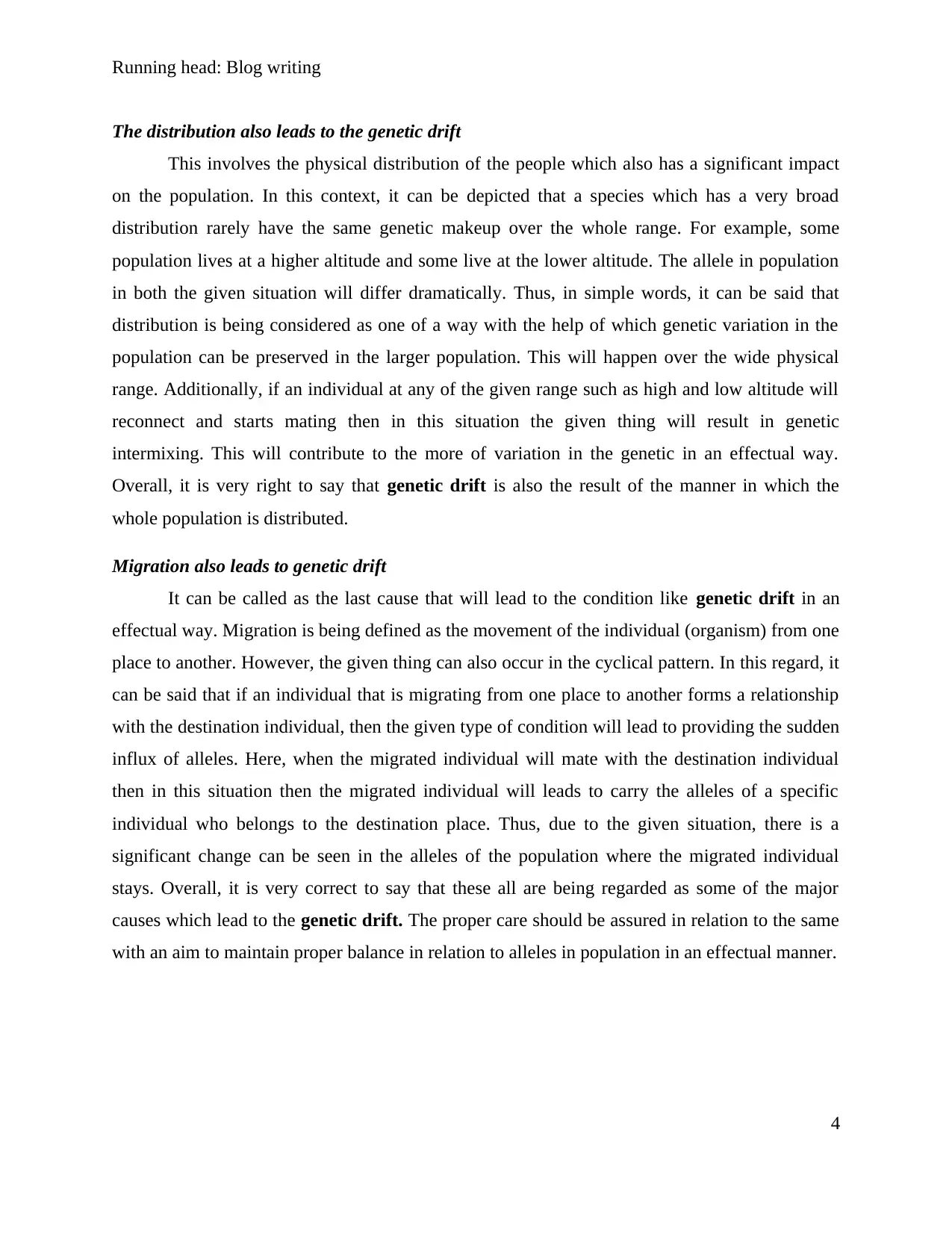
Running head: Blog writing
The distribution also leads to the genetic drift
This involves the physical distribution of the people which also has a significant impact
on the population. In this context, it can be depicted that a species which has a very broad
distribution rarely have the same genetic makeup over the whole range. For example, some
population lives at a higher altitude and some live at the lower altitude. The allele in population
in both the given situation will differ dramatically. Thus, in simple words, it can be said that
distribution is being considered as one of a way with the help of which genetic variation in the
population can be preserved in the larger population. This will happen over the wide physical
range. Additionally, if an individual at any of the given range such as high and low altitude will
reconnect and starts mating then in this situation the given thing will result in genetic
intermixing. This will contribute to the more of variation in the genetic in an effectual way.
Overall, it is very right to say that genetic drift is also the result of the manner in which the
whole population is distributed.
Migration also leads to genetic drift
It can be called as the last cause that will lead to the condition like genetic drift in an
effectual way. Migration is being defined as the movement of the individual (organism) from one
place to another. However, the given thing can also occur in the cyclical pattern. In this regard, it
can be said that if an individual that is migrating from one place to another forms a relationship
with the destination individual, then the given type of condition will lead to providing the sudden
influx of alleles. Here, when the migrated individual will mate with the destination individual
then in this situation then the migrated individual will leads to carry the alleles of a specific
individual who belongs to the destination place. Thus, due to the given situation, there is a
significant change can be seen in the alleles of the population where the migrated individual
stays. Overall, it is very correct to say that these all are being regarded as some of the major
causes which lead to the genetic drift. The proper care should be assured in relation to the same
with an aim to maintain proper balance in relation to alleles in population in an effectual manner.
4
The distribution also leads to the genetic drift
This involves the physical distribution of the people which also has a significant impact
on the population. In this context, it can be depicted that a species which has a very broad
distribution rarely have the same genetic makeup over the whole range. For example, some
population lives at a higher altitude and some live at the lower altitude. The allele in population
in both the given situation will differ dramatically. Thus, in simple words, it can be said that
distribution is being considered as one of a way with the help of which genetic variation in the
population can be preserved in the larger population. This will happen over the wide physical
range. Additionally, if an individual at any of the given range such as high and low altitude will
reconnect and starts mating then in this situation the given thing will result in genetic
intermixing. This will contribute to the more of variation in the genetic in an effectual way.
Overall, it is very right to say that genetic drift is also the result of the manner in which the
whole population is distributed.
Migration also leads to genetic drift
It can be called as the last cause that will lead to the condition like genetic drift in an
effectual way. Migration is being defined as the movement of the individual (organism) from one
place to another. However, the given thing can also occur in the cyclical pattern. In this regard, it
can be said that if an individual that is migrating from one place to another forms a relationship
with the destination individual, then the given type of condition will lead to providing the sudden
influx of alleles. Here, when the migrated individual will mate with the destination individual
then in this situation then the migrated individual will leads to carry the alleles of a specific
individual who belongs to the destination place. Thus, due to the given situation, there is a
significant change can be seen in the alleles of the population where the migrated individual
stays. Overall, it is very correct to say that these all are being regarded as some of the major
causes which lead to the genetic drift. The proper care should be assured in relation to the same
with an aim to maintain proper balance in relation to alleles in population in an effectual manner.
4
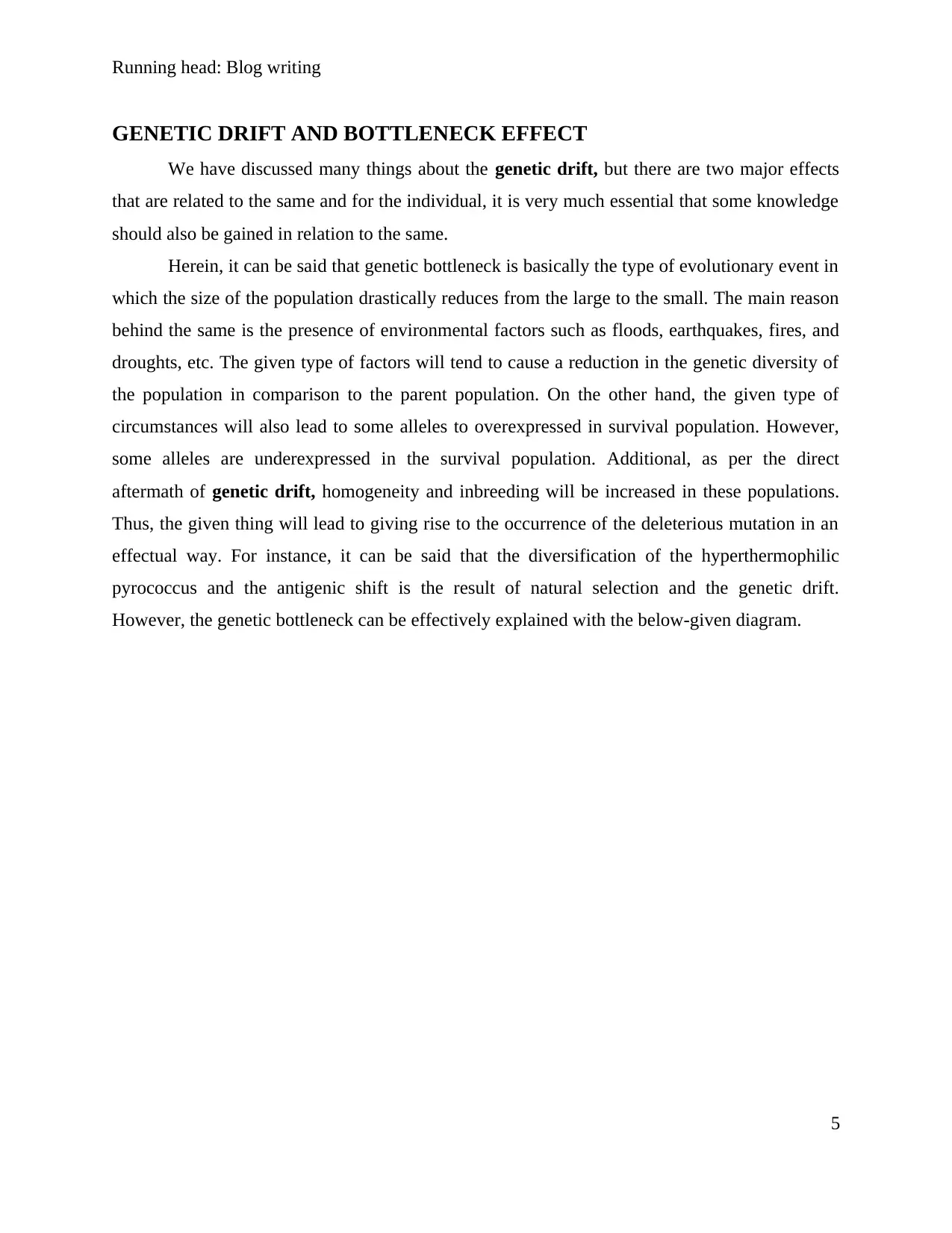
Running head: Blog writing
GENETIC DRIFT AND BOTTLENECK EFFECT
We have discussed many things about the genetic drift, but there are two major effects
that are related to the same and for the individual, it is very much essential that some knowledge
should also be gained in relation to the same.
Herein, it can be said that genetic bottleneck is basically the type of evolutionary event in
which the size of the population drastically reduces from the large to the small. The main reason
behind the same is the presence of environmental factors such as floods, earthquakes, fires, and
droughts, etc. The given type of factors will tend to cause a reduction in the genetic diversity of
the population in comparison to the parent population. On the other hand, the given type of
circumstances will also lead to some alleles to overexpressed in survival population. However,
some alleles are underexpressed in the survival population. Additional, as per the direct
aftermath of genetic drift, homogeneity and inbreeding will be increased in these populations.
Thus, the given thing will lead to giving rise to the occurrence of the deleterious mutation in an
effectual way. For instance, it can be said that the diversification of the hyperthermophilic
pyrococcus and the antigenic shift is the result of natural selection and the genetic drift.
However, the genetic bottleneck can be effectively explained with the below-given diagram.
5
GENETIC DRIFT AND BOTTLENECK EFFECT
We have discussed many things about the genetic drift, but there are two major effects
that are related to the same and for the individual, it is very much essential that some knowledge
should also be gained in relation to the same.
Herein, it can be said that genetic bottleneck is basically the type of evolutionary event in
which the size of the population drastically reduces from the large to the small. The main reason
behind the same is the presence of environmental factors such as floods, earthquakes, fires, and
droughts, etc. The given type of factors will tend to cause a reduction in the genetic diversity of
the population in comparison to the parent population. On the other hand, the given type of
circumstances will also lead to some alleles to overexpressed in survival population. However,
some alleles are underexpressed in the survival population. Additional, as per the direct
aftermath of genetic drift, homogeneity and inbreeding will be increased in these populations.
Thus, the given thing will lead to giving rise to the occurrence of the deleterious mutation in an
effectual way. For instance, it can be said that the diversification of the hyperthermophilic
pyrococcus and the antigenic shift is the result of natural selection and the genetic drift.
However, the genetic bottleneck can be effectively explained with the below-given diagram.
5
⊘ This is a preview!⊘
Do you want full access?
Subscribe today to unlock all pages.

Trusted by 1+ million students worldwide
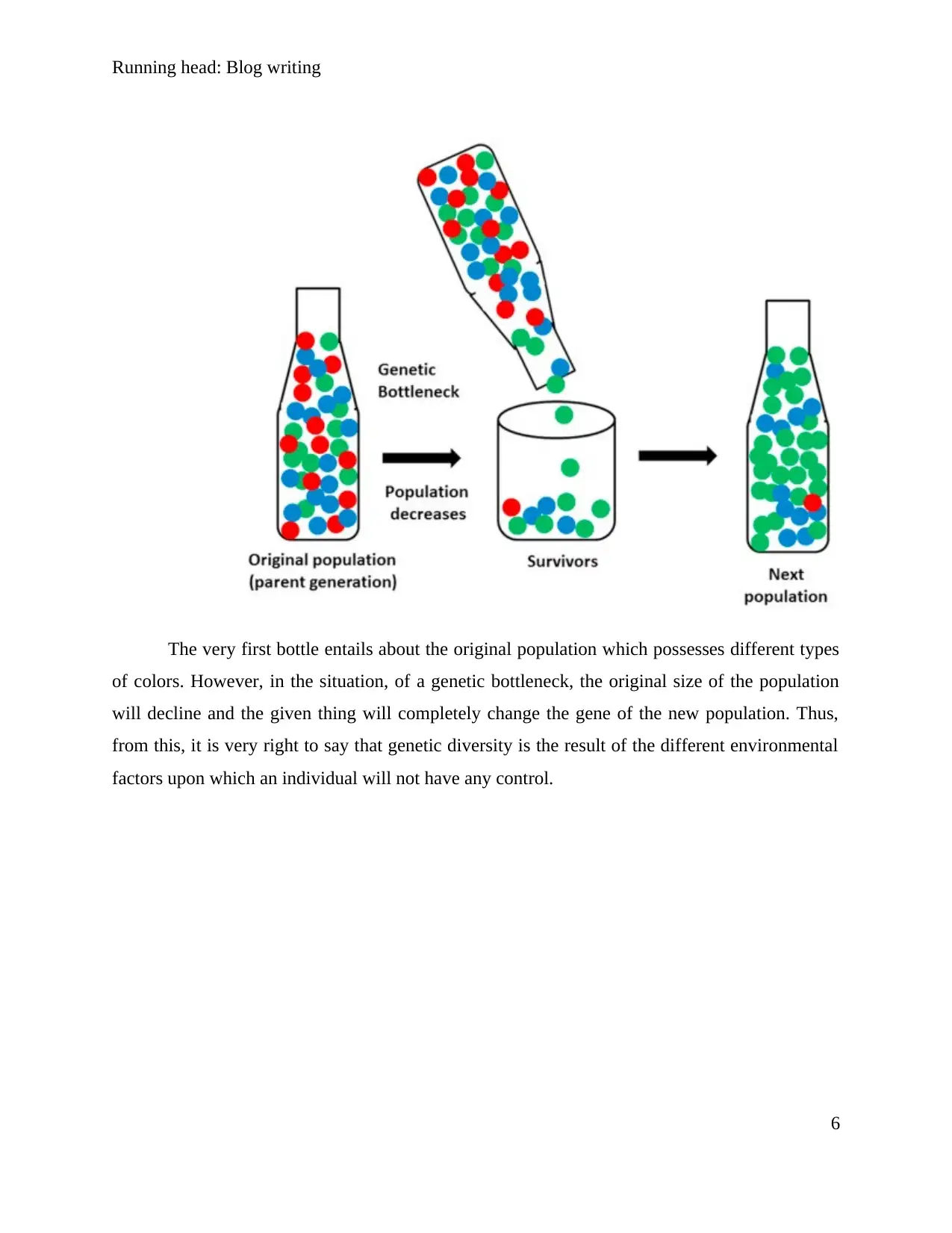
Running head: Blog writing
The very first bottle entails about the original population which possesses different types
of colors. However, in the situation, of a genetic bottleneck, the original size of the population
will decline and the given thing will completely change the gene of the new population. Thus,
from this, it is very right to say that genetic diversity is the result of the different environmental
factors upon which an individual will not have any control.
6
The very first bottle entails about the original population which possesses different types
of colors. However, in the situation, of a genetic bottleneck, the original size of the population
will decline and the given thing will completely change the gene of the new population. Thus,
from this, it is very right to say that genetic diversity is the result of the different environmental
factors upon which an individual will not have any control.
6
Paraphrase This Document
Need a fresh take? Get an instant paraphrase of this document with our AI Paraphraser
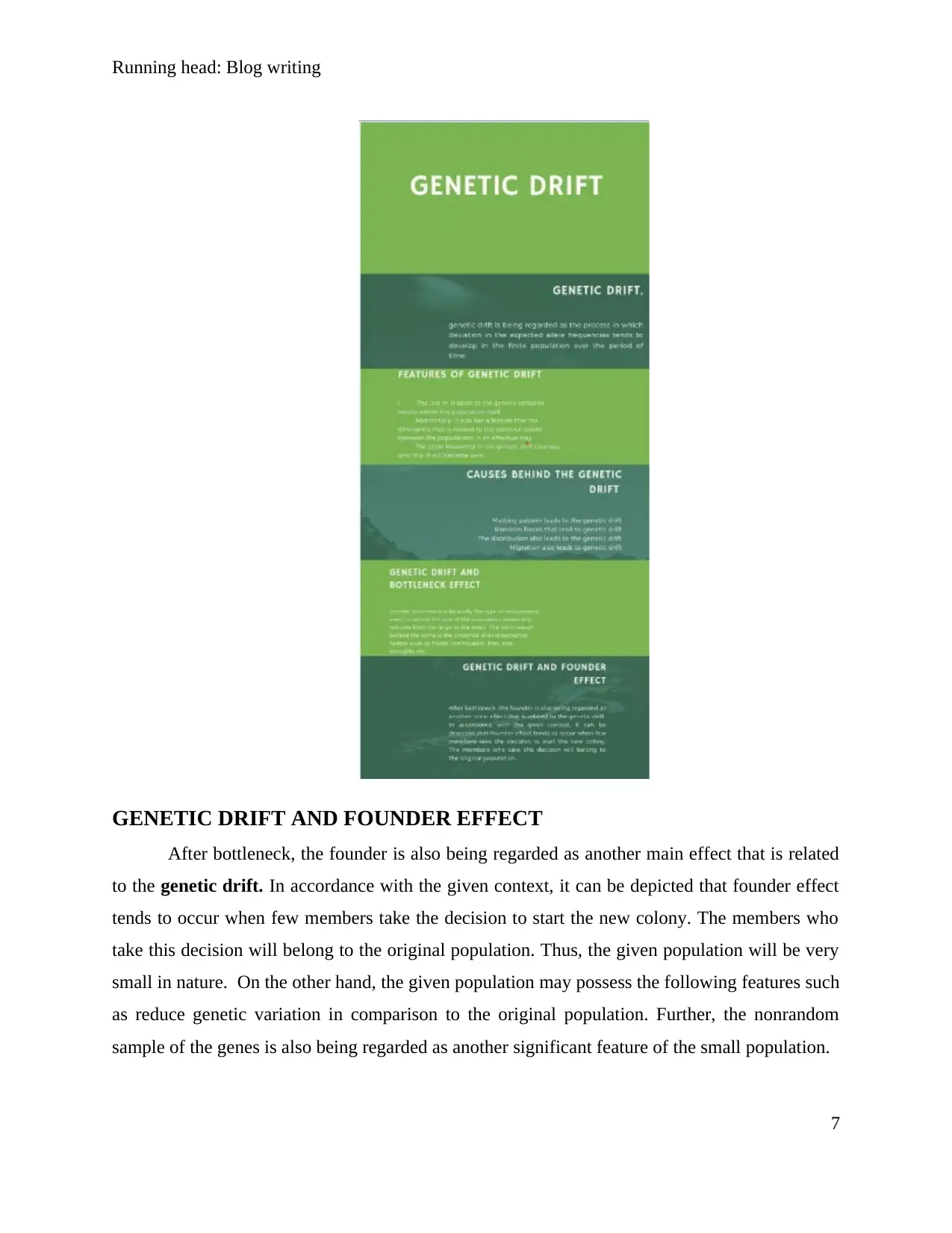
Running head: Blog writing
GENETIC DRIFT AND FOUNDER EFFECT
After bottleneck, the founder is also being regarded as another main effect that is related
to the genetic drift. In accordance with the given context, it can be depicted that founder effect
tends to occur when few members take the decision to start the new colony. The members who
take this decision will belong to the original population. Thus, the given population will be very
small in nature. On the other hand, the given population may possess the following features such
as reduce genetic variation in comparison to the original population. Further, the nonrandom
sample of the genes is also being regarded as another significant feature of the small population.
7
GENETIC DRIFT AND FOUNDER EFFECT
After bottleneck, the founder is also being regarded as another main effect that is related
to the genetic drift. In accordance with the given context, it can be depicted that founder effect
tends to occur when few members take the decision to start the new colony. The members who
take this decision will belong to the original population. Thus, the given population will be very
small in nature. On the other hand, the given population may possess the following features such
as reduce genetic variation in comparison to the original population. Further, the nonrandom
sample of the genes is also being regarded as another significant feature of the small population.
7
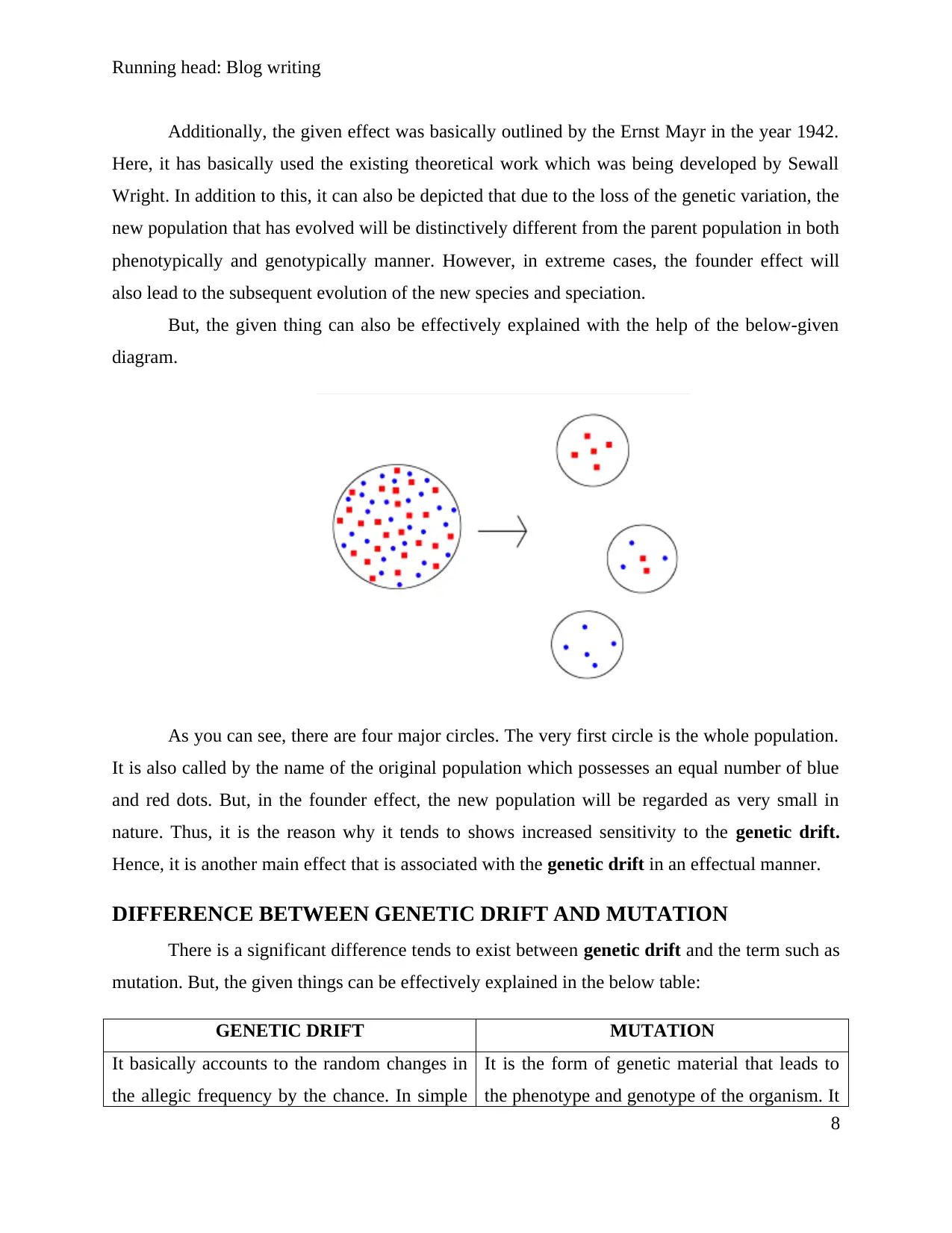
Running head: Blog writing
Additionally, the given effect was basically outlined by the Ernst Mayr in the year 1942.
Here, it has basically used the existing theoretical work which was being developed by Sewall
Wright. In addition to this, it can also be depicted that due to the loss of the genetic variation, the
new population that has evolved will be distinctively different from the parent population in both
phenotypically and genotypically manner. However, in extreme cases, the founder effect will
also lead to the subsequent evolution of the new species and speciation.
But, the given thing can also be effectively explained with the help of the below-given
diagram.
As you can see, there are four major circles. The very first circle is the whole population.
It is also called by the name of the original population which possesses an equal number of blue
and red dots. But, in the founder effect, the new population will be regarded as very small in
nature. Thus, it is the reason why it tends to shows increased sensitivity to the genetic drift.
Hence, it is another main effect that is associated with the genetic drift in an effectual manner.
DIFFERENCE BETWEEN GENETIC DRIFT AND MUTATION
There is a significant difference tends to exist between genetic drift and the term such as
mutation. But, the given things can be effectively explained in the below table:
GENETIC DRIFT MUTATION
It basically accounts to the random changes in
the allegic frequency by the chance. In simple
It is the form of genetic material that leads to
the phenotype and genotype of the organism. It
8
Additionally, the given effect was basically outlined by the Ernst Mayr in the year 1942.
Here, it has basically used the existing theoretical work which was being developed by Sewall
Wright. In addition to this, it can also be depicted that due to the loss of the genetic variation, the
new population that has evolved will be distinctively different from the parent population in both
phenotypically and genotypically manner. However, in extreme cases, the founder effect will
also lead to the subsequent evolution of the new species and speciation.
But, the given thing can also be effectively explained with the help of the below-given
diagram.
As you can see, there are four major circles. The very first circle is the whole population.
It is also called by the name of the original population which possesses an equal number of blue
and red dots. But, in the founder effect, the new population will be regarded as very small in
nature. Thus, it is the reason why it tends to shows increased sensitivity to the genetic drift.
Hence, it is another main effect that is associated with the genetic drift in an effectual manner.
DIFFERENCE BETWEEN GENETIC DRIFT AND MUTATION
There is a significant difference tends to exist between genetic drift and the term such as
mutation. But, the given things can be effectively explained in the below table:
GENETIC DRIFT MUTATION
It basically accounts to the random changes in
the allegic frequency by the chance. In simple
It is the form of genetic material that leads to
the phenotype and genotype of the organism. It
8
⊘ This is a preview!⊘
Do you want full access?
Subscribe today to unlock all pages.

Trusted by 1+ million students worldwide
1 out of 9
Related Documents
Your All-in-One AI-Powered Toolkit for Academic Success.
+13062052269
info@desklib.com
Available 24*7 on WhatsApp / Email
![[object Object]](/_next/static/media/star-bottom.7253800d.svg)
Unlock your academic potential
Copyright © 2020–2025 A2Z Services. All Rights Reserved. Developed and managed by ZUCOL.





